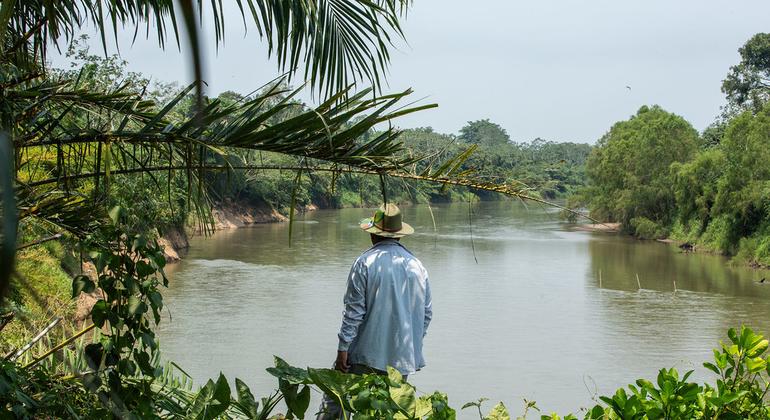Sure! Here’s the translation into American English:
—
In the 1970s, Bajo Aguán established itself as the nerve center of Honduras’ agrarian reform. This process involved the forced displacement of hundreds of families from the south and west of the country to fertile lands, with the promise of a dignified life. Bardia Jebeli, Deputy Representative of the UN Human Rights Office in Honduras, emphasizes that “Bajo Aguán became ‘the capital of agrarian reform.’”
However, the vast expanse of this region, along with its high productive potential, has attracted various actors, creating a context of impunity and lack of state presence. This has allowed crimes such as land dispossession and murders to persist. Following legislative changes in the 1990s, the massive purchase of lands originally intended for agrarian reform by agro-industrial entrepreneurs was facilitated through Decree 31-92, creating a land market characterized by violence and corruption.
Those who have chosen to resist this dynamic face serious consequences. An emblematic case occurred on November 15, 2010, when five farmers were killed in El Tumbador while trying to reclaim land. Celedonio Ramírez, a survivor of the assault, recounts that “I was shot in the mouth and in the leg,” but what he truly clings to is the conviction that their struggle is not an invasion of land, but a reclamation of what belongs to them.
Poverty in the region is alarming, with 80% of those suffering from hunger in Honduras living in rural areas. Many are small-scale farmers and subsistence agricultural workers. These communities not only face the dispossession of their lands but also systematic discrimination and multiple obstacles in accessing basic rights such as food and water, while phenomena like climate change threaten their livelihoods.
Amid this struggle, both farmers and rural workers have adopted a discourse of resistance. María Alemán, a spokesperson for the Brisas del Aguán cooperative, denounces that “we have a colleague who has been kidnapped. Trucks seized with our products. Many have left due to death threats.” The criminalization of the farmers’ struggle is accompanied by the stigmatization of their movements as criminal acts.
On the other hand, the role of the UN Human Rights Office has been crucial in this context. Its presence allows communities to glimpse a way out, finding in organization and collective struggle the only means for survival. “The role of the High Commissioner’s office has been a helping hand,” says Alemán. Since 2022, this office has been fighting against human rights violations, providing support for complaints and facilitating dialogue between the government and farmers’ organizations. The signing of the agreement on February 22, 2022, which established the creation of a Tripartite Commission to investigate human rights violations, reflects the positive impact of this support, although its implementation remains uncertain.
Despite the complexity of the situation, the determination of the communities is unwavering: “Land is not for sale; it’s not a business,” Alemán asserts. This slogan resonates with the profound connection they feel to the land and their struggle for a dignified future, while the need for a legal framework that supports their rights becomes increasingly urgent.
Source: MiMub in Spanish
